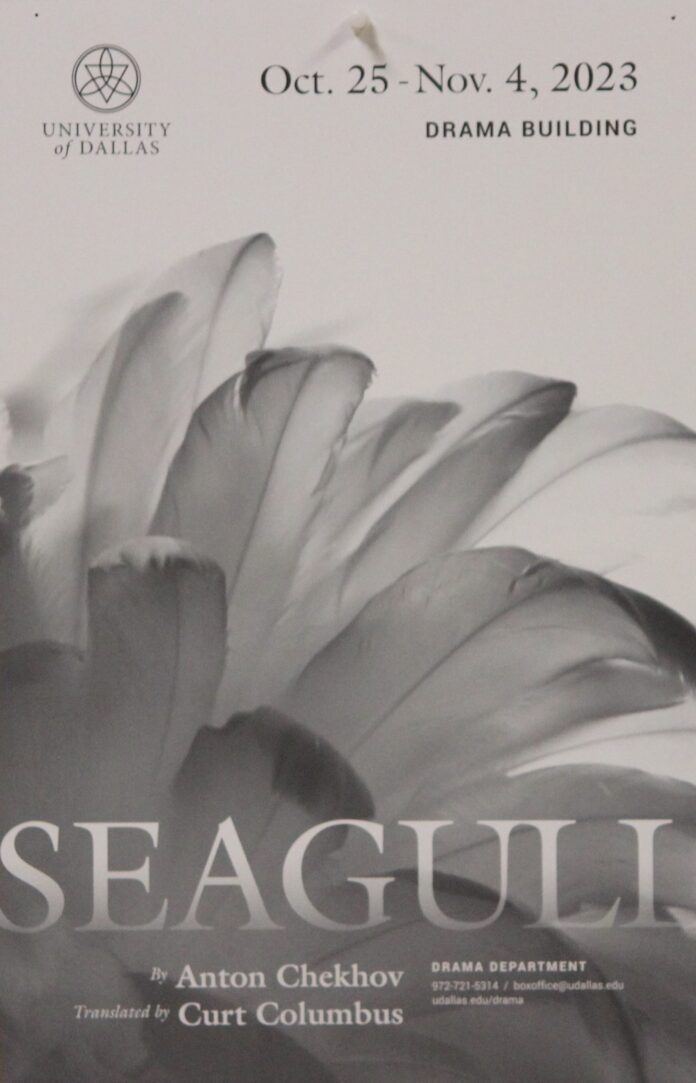A senior English major’s reaction to theatrical savvy
The drama department at the University of Dallas has once again impressed its audience with a dazzling performance. This season’s fall production of “Seagull” by Anton Chekhov is filled with riveting angst, worlds apart from “The Marriage of Figaro” in the Spring.
A tale of domestic strife and impassioned conflict, Chekhov’s “Seagull” as performed by our beloved UD students is a force to be reckoned with. Leaving you emotionally torn and intellectually at war with yourself, this performance is not one to miss.
Chekhov’s plays were initially criticized as boring in their focus on domestic life, but there’s something about the familiarity of the domestic setting found in “Seagull” that at once pulls its audience in and yet repels it.
The drama department’s theater has been crafted as a thrust stage this season, that is, a stage surrounded on three sides by audience members. This set-up paired with the intimate home setting puts you, as an audience member, into the strange position of observer, confidant and intruder, as the cast of troubled characters attempt to hide their turbulent interiors from you, from each other, and even from themselves.
The play kicks off in the middle of an action as an audience member, must discover where you are and with whom, all while trying to get names and stories straight in your head. It all seems simple enough. You discover: a family and a few close friends at a country estate, practicing their respective arts, such as writing and acting.
The domestic setting, the familiarity of family and the intimacy of the thrust stage give you an illusion of comfort until one look, one stretch of silence, one strained laugh denotes a charge of tension hidden just beneath the surface. It tightens and tightens until it finally bursts at the fever pitch. The entire cast has created a phenomenal production, and the mother-son duo played by Sienna Abbott and Benjamin Thomas are one of its main highlights. The raw human emotion that bubbles beneath each character’s facade before finally exploding before your very eyes may leave you crying, shaking and thoroughly engrossed.
Sitting in that theater, when the lights dimmed after the conclusion of the final scene (illuminating, for just a moment, one specific character’s expression, one final time) the audience did not know how to react. After being immersed in this experience for two and a half hours, and after such intensity of feeling, we were all stunned into silence, not quite sure how to process what we’d witnessed, but realizing it was time to applaud.
Chekhov’s play, however, is not a mere catharsis and twisting of your emotions, but also a vastly thought-provoking story that will leave you muddled in your own head and in tears by the end.
What is the telos of art? Is art life-giving, or an impassioned, consuming creature? Is art divisive or unitive of people? What does it mean to live in dissonance from others and – more painfully from yourself?
The theater was made to be immersive and compellingly thought-provoking, and UD’s drama department did not disappoint.
UD students often forget the power of theater. We get so caught up in our intellectual ideas that this medium of thought and art combined is often looked down upon or undervalued. We scoff at the emotion it evokes in us, the empathy, perhaps because we fear the intellectual result of such a heavily emotional experience.
However, I would argue that it is when big ideas, such as the contemplation of art, self and humanity, are brought into the context of particulars that we can more fully contemplate and understand it. “Seagull” is an emotionally philosophical inquiry into human experience and an inestimable opportunity that you ought not miss.
